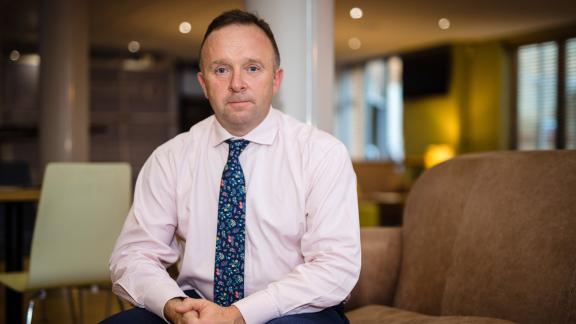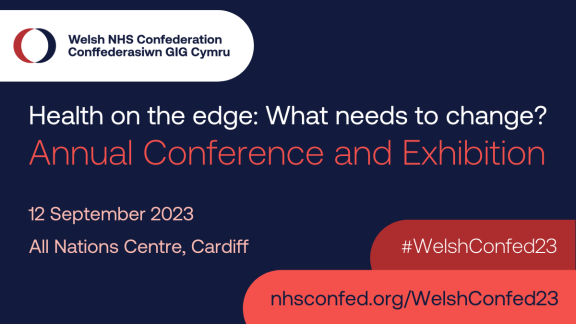Taking steps to answer the question ‘Health on the edge: What needs to change?’

This month we held our annual conference, posing the challenge: Health on the edge: What needs to change? The event brought together our members, partners, health stakeholders and politicians and covered NHS leaders’ priority areas. There was a focus on prevention, inequalities, public engagement, population health, partnership working and ultimately what needs to change.
A huge thanks must go to our event partners ABPI Cymru, Novartis and Optum, as well as our wonderful speakers, supporters, exhibitors and of course to everyone who attended. Our conference wouldn’t be what it is without any one of these parts.
As Welsh NHS Confederation chair Emma Woollett said in her opening remarks, the health and care system has faced more challenges this year than ever before, with winter not stopping in spring. We continue to face a perfect storm of increasing demand, record waiting lists, a tired workforce with many vacancies and huge financial pressures, which inevitably impacts the health and wellbeing of our population.
As the NHS battles unprecedented financial challenges, there will be hard choices on deploying finite resources in the most efficient way, using every pound as effectively as we can.
The need for change
The day was set against a backdrop of our calls for a cross-government, cross-sector national conversation on the future of health, endorsed by over 32 organisations. There was consensus from all speakers, organisations and sectors that we need to transform the way we deliver care and that difficult decisions will have to be made. As the NHS battles unprecedented financial challenges, there will be hard choices on deploying finite resources in the most efficient way, using every pound as effectively as we can. But as our chief executive, Matthew Taylor said: "Wales is well-placed to achieve a revolution in public health".
As Linda Moir alluded to, we must not forget to consider staff as partners. Creating a collaborative culture is essential to improvement: making staff feel like they can take initiative and being given the freedom to excel.
Partnership working
Speakers agreed this conversation must take place in partnership, informed by those who use services and the staff at the heart of delivering them. As Judith Paget said, we must all redouble efforts to remove siloes, as we witnessed during the pandemic, and further nurture partnerships. Professor Robin Millar pointed out that so often people are keen to share what works when it comes to partnerships but are reluctant to share what’s been difficult or what hasn’t worked so well. This is essential learning to enable us to move forward. The role of the third sector as partners, providers, and the role of volunteers was mentioned throughout, including the part third sector organisations play in engaging with service users.
And as Linda Moir alluded to, we must not forget to consider staff as partners. Creating a collaborative culture is essential to improvement: making staff feel like they can take initiative and being given the freedom to excel. The best ideas often come from those who work with service users. Linda emphasised the importance of considering staff morale as an essential contributor to the experience of service users and the role a collaborative culture plays in this.
Our chief executive Matthew pointed out that we need to have a different conversation with the public if we are to be sustainable. This entails having a conversation about how we empower people, giving them agency over their own health, how we enable and better equip them to make better choices by raising health literacy.
Engaging with the public
Another core theme of the day was that public engagement is non-negotiable. Public service pioneer Professor Donna Hall CBE put forward the convincing case to change the way we think about patients and the public. She said we often see patients as passive recipients of services, but they must be active participants in the design of services. Our chief executive Matthew, among other speakers, pointed out that we need to have a different conversation with the public if we are to be sustainable. This entails having a conversation about how we empower people, giving them agency over their own health, how we enable and better equip them to make better choices by raising health literacy. It’s also key to understand the barriers patients and the public face to changing their behaviours.
As Paul Mears, chief executive of Cwm Taf Morgannwg University Health Board pointed out, the way we have conversations is really important. We need to handle these conversations carefully, not telling people the ways in which they need to do better, instead looking at how we can do things differently to achieve better outcomes, thinking about what tools we need to give people to achieve this. Often, the most effective way of having these conversations is through peer support, community groups, volunteer groups.
Conference anchor and BBC health correspondent Owain Clarke challenged us all, asking: How do we translate these ideas into action? How do we remove barriers to change, both at a system and population level, enabling action? How do we better empower people and communities?
What next?
As government ministers, public service leaders and government officials start making these difficult financial decisions, it’s essential that both the short and long-term impact is considered. We can’t underestimate the value of investing somewhere now to make huge future savings and improvements in population health and wellbeing. We must also always consider and address inequalities as part of these conversations.
The Plenary session supported by Optum challenged us to think innovatively about how we use data to target prevention and intervention to improve outcomes, for example focusing efforts on people who don't yet have co-morbidities but who are most at risk. They encouraged us to think differently about how we measure outcomes and consider incentives to be braver and bolder to meet the needs of the public.
As the day came to an end, conference anchor and BBC health correspondent Owain Clarke challenged us all, asking: How do we translate these ideas into action? How do we remove barriers to change, both at a system and population level, enabling action? How do we better empower people and communities? With the return of the Senedd, winter pressures approaching and finances a top priority for NHS leaders, we will continue to make the case for a whole-nation conversation, supporting and representing NHS leaders along the way.


